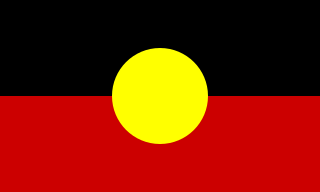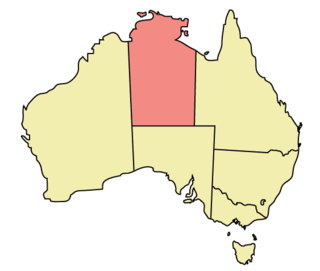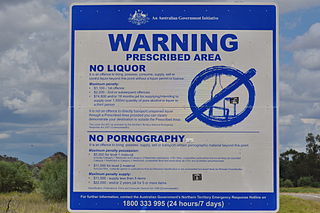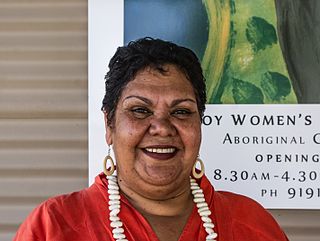External links
| | This article about an Australian documentary film is a stub. You can help Wikipedia by expanding it. |
Yajilarra is a documentary film by Australian director Melanie Hogan about the resilience of the Aboriginal women in the remote Kimberly region of outback Australia.
‘Yajillara’, in the Bunuba Indigenous language means ‘to dream’.
In 2007 a group of Aboriginal women from the Fitzroy Valley in Australia's remote northwest decided "enough was enough". Their community had experienced 13 suicides in 13 months. Reports of family violence and child abuse were commonplace and alcohol consumption was rising at an alarming rate.
A group of courageous Aboriginal women from across the Valley came together, with the support of many men, to fight for a future for everyone in their community. The results were inspiring and the healing has now begun, with the film playing a key role in the creation and rolling out of alcohol restrictions throughout the Kimberly.
In 2009 an event was hosted by the Federal Sex Discrimination Commissioner Elizabeth Broderick and the Hon. Tanya Plibersek MP, Australian Minister for the Status of Women at the 53rd Session of the UN Commission of the Status of Women (CSW) in New York. This was the first occasion at which Indigenous women form Australia were presented at CSW.
The Central Australian Aboriginal Media Association (CAAMA) is an organisation founded in 1980 to expose Aboriginal music and culture to the rest of Australia. Based in Alice Springs, the organisation is particularly focused on the involvement of the local Indigenous community in its production. CAAMA is involved in radio, television and recorded music.

Arnhem Land is a historical region of the Northern Territory of Australia, with the term still in use today. It is located in the north-eastern corner of the territory and is around 500 km (310 mi) from the territory capital, Darwin. In 1623, Dutch East India Company captain Willem Joosten van Colster sailed into the Gulf of Carpentaria and Cape Arnhem is named after his ship, the Arnhem, which itself was named after the city of Arnhem in the Netherlands.
Oombulgurri, also written as Umbulgara, was an Aboriginal community in the eastern Kimberley, 45 kilometres (28 mi) by air and about 210 kilometres (130 mi) by road northwest of Wyndham. it had a population of 107 as of the 2006 census. It was inhabited by the Yeidji people who now self-identify as Balanggarra. In 2011, the government of Western Australia encouraged residents of Oombulgurri to move elsewhere, after it deemed the community unsustainable. The last residents from Oombulgurri were relocated to Wyndham just before Christmas 2011.

Fitzroy Crossing is a small town in the Kimberley region of Western Australia, 400 kilometres (250 mi) east of Broome and 300 kilometres (190 mi) west of Halls Creek. It is approximately 2,524 kilometres (1,568 mi) from the state capital of Perth. It is 114 metres (374 ft) above sea level and is situated on a low rise surrounded by the vast floodplains of the Fitzroy River and its tributary Margaret River.

Aboriginal Australians are the various Indigenous peoples of the Australian mainland and many of its islands, such as Tasmania, Fraser Island, Hinchinbrook Island, the Tiwi Islands, and Groote Eylandt, but excluding the Torres Strait Islands. The term Indigenous Australians refers to Aboriginal Australians and Torres Strait Islanders collectively. It is generally used when both groups are included in the topic being addressed. Torres Strait Islanders are ethnically and culturally distinct, despite extensive cultural exchange with some of the Aboriginal groups. The Torres Strait Islands are mostly part of Queensland but have a separate governmental status.

Crime in the Northern Territory is managed by the Northern Territory Police, the territory government's Department of the Attorney-General and Justice and Territory Families.
An outstation, homeland or homeland community is a very small, often remote, permanent community of Aboriginal Australian people connected by kinship, on land that often, but not always, has social, cultural or economic significance to them, as traditional land. The outstation movement or homeland movement refers to the voluntary relocation of Aboriginal people from towns to these locations.

Utopia is an Aboriginal Australian homeland area formed in November 1978 by the amalgamation of the former Utopia pastoral lease with a tract of unalienable land to its north. It covers an area of 3,500 km2 (1,400 sq mi), transected by the Sandover River, and lies on a traditional boundary of the Alyawarre and Anmatyerre people, the two Aboriginal language groups which predominate there today.

Aṉangu Pitjantjatjara Yankunytjatjara, also known as APY, APY Lands or the Lands, is a large, sparsely-populated local government area (LGA) for Aboriginal people, located in the remote north west of South Australia. Some of the aṉangu (people) of the Western Desert cultural bloc, in particular Pitjantjatjara, Yankunytjatjara and Ngaanyatjarra peoples, inhabit the Lands.
Indigenous Australians or Australian First Nations are people with familial heritage from, and membership in, the ethnic groups that lived in Australia before British colonisation. They consist of two distinct groups: the Aboriginal peoples of the Australian mainland and Tasmania, and the Torres Strait Islander peoples from the seas between Queensland and Papua New Guinea. The term Aboriginal and Torres Strait Islander peoples or the person's specific cultural group, is often preferred, though the terms First Nations of Australia, First Peoples of Australia and First Australians are also increasingly common, 812,728 people self-identified as being of Aboriginal and/or Torres Strait Islander origin in the 2021 Australian Census, representing 3.2 % of the total population of Australia. Of these indigenous Australians, 91.4 % identified as Aboriginal; 4.2 % identified as Torres Strait Islander; while 4.4 % identified with both groups. Since 1995, the Australian Aboriginal flag and the Torres Strait Islander flag have been among the official flags of Australia.

The Northern Territory National Emergency Response, also known as "The Intervention" or the Northern Territory Intervention, and sometimes the abbreviation "NTER" was a package of measures enforced by legislation affecting Indigenous Australians in the Northern Territory (NT) of Australia, which lasted from 2007 until 2012. The measures included restrictions on the consumption of alcohol and pornography, changes to welfare payments, and changes to the delivery and management of education, employment and health services in the Territory.
The Australian Indigenous Communications Association (AICA) is the peak body for Australia's Aboriginal and Torres Strait Islander broadcasters. It is the successor to the National Indigenous Media Association of Australia (NIMAA).

Alcohol is commonly consumed and available at pubs and liquor stores in Australia – all of which are private enterprises. Spirits can be purchased at liquor stores and pubs, whereas grocery stores do not sell them, although they may have separate liquor stores on their premises. Alcohol consumption is higher, according to WHO studies, than in most European countries and several Central Asian and African countries, although consumption is just as high in Australia as in North America. After tobacco, alcohol is the second leading preventable cause of death and hospitalisation in Australia.
Indigenous Australians are both convicted of crimes and imprisoned at a disproportionately higher rate in Australia, as well as being over-represented as victims of crime. As of September 2019, Aboriginal and Torres Strait Islander prisoners represented 28% of the total adult prisoner population, while accounting for 2% of the general adult population. Various explanations have been given for this over-representation, both historical and more recent. Federal and state governments and Indigenous groups have responded with various analyses, programs and measures.
The Stronger Futures policy is a multifaceted social policy of the Australian government concerning the Aboriginal population of the Northern Territory. It is underpinned by the Stronger Futures in the Northern Territory Act 2012, which ceases to have effect 10 years after its commencement on 29 June 2012.
Indigenous health in Australia examines health and wellbeing indicators of Indigenous Australians compared with the rest of the population. Statistics indicate that Aboriginal Australians and Torres Strait Islanders are much less healthy than other Australians. Various government strategies have been put into place to try to remediate the problem; there has been some improvement in several areas, but statistics between Indigenous Australians and the rest of the Australian population still show unacceptable levels of difference.
Melanie Hogan is a film director and producer, known for her works in Australian documentary cinema. Hogan became first known with her directorial debut Kanyini which premiered at the Sydney Film Festival in 2006. The film came out of Hogan’s personal realization that she had not learnt anything about the history of her country, Australia, from an Aboriginal perspective despite studying in Australian Institutions right through to tertiary level. She also lamented the fact that she did not know anything about the world's oldest living culture.

June Oscar is an Australian Aboriginal woman of Bunuba descent, Indigenous rights activist, community health and welfare worker, film and theatre ,and since 2017 and as of February 2022 Aboriginal and Torres Strait Islander Social Justice Commissioner.
Alcohol in rural Australia is the most frequently used drug by residents living in all isolated, remote and rural regions in Australia. Alcohol consumption is particularly misused by individuals in these areas due to numerous factors distinctive of rural Australia. These factors consist of the reduced access to education and health care professionals with alcohol treatment services, leading to higher rates of unemployment and economic disadvantage. These characteristics promote increased levels of disease, injury and death as a result of the high alcohol-related harms that are substantial in rural communities across Australia.
Alice Springs town camps, officially called Alice Springs Community Living Areas, are Aboriginal communities within Alice Springs in the Northern Territory of Australia. Their origins vary. Many were originally designed to accommodate people visiting Alice Springs from remote communities but, for many, they have become a permanent and often generational home.